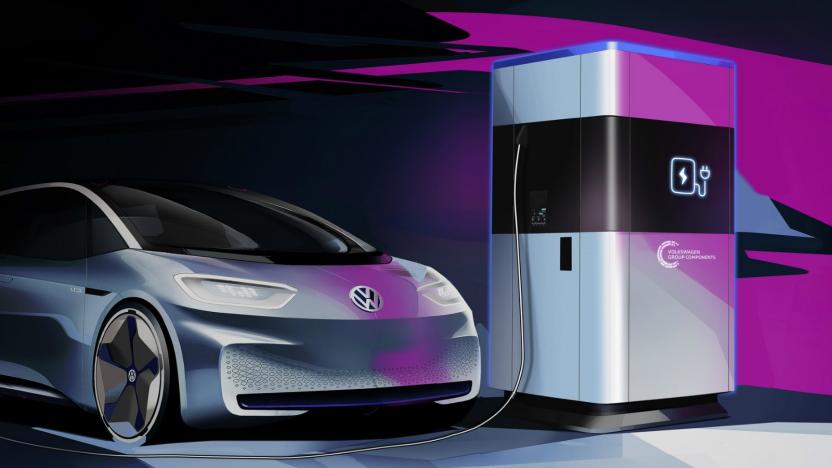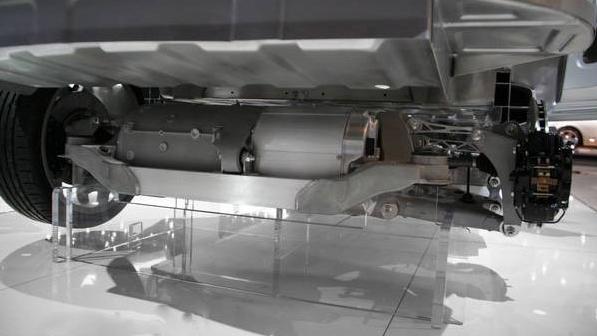CarBattery
Latest

Volkswagen will produce its own car batteries and mobile EV chargers
Volkswagen's been trying to claw back its credibility with an ambitious commitment to EVs ever since its $18.2 billion dollar emissions scandal. Its lofty production goals aside, the German manufacturer's latest green move could see it kickstart Europe's car battery industry. In back-to-back announcements, VW said today that it will start building car batteries -- as well as recycling old cells -- and mobile EV charging stations (which are heading to the streets of its hometown of Wolfsburg in the first half of this year). VW is promising to pump $870 million (£754 million) into the venture by 2020.

EV battery-maker says Apple poached engineers for its new project
Did you hear that Apple might be working on a car, or at least something that heavily involves cars? It's reportedly already got quite a team working away at the project. But, those employees had to come from somewhere, right? According to a lawsuit from electric car battery maker A123 Systems, Apple has been poaching its best engineers, apparently to work in a battery division of its own. The company alleges poaching started back in June 2014, with Apple drawing away lead engineers from the battery maker's "most critical projects." According to the filing from Massachusetts federal court: "Apple is currently developing a large-scale battery division to compete in the very same field as A123."

Discarded car batteries could become low-cost solar cells
It's great that manufacturers recover lead from discarded car batteries to use in new ones, since lead production from ores yields toxic residues. The problem is, when we shift from lead-acid to lithium-ion and other types of batteries (and we're starting to), over 200 million old batteries could be retired in the US and cause serious environmental issues. Thankfully, a team of MIT researchers has discovered one way to recycle lead from car batteries, and the end product is something very, very useful: long-lasting solar cells. We're talking about a new breed of solar cells in particular, one that uses a compound called perovskite, which needs lead to be manufactured.

Israel gets its first EV battery swap station, makes charging stations obsolete
Don't get us wrong, we think electric vehicles are totally rad and all, but there's still the whole recharging thing that makes us a little wary. That's why we're stoked to hear that Better Place's first battery swap station for EVs (and not just special Japanese cabbies) has officially opened its doors in Israel... for owners of the Renault Fluence Z.E. All it takes is an RFID card to enter the carwash-esque structure, and robots from below swap out your empty battery for a fully charged alternative while you occupy yourself for three minutes. No word on how much it'll cost for the opportunity, but we've got an inkling it won't be cheap. Fortunately, we've got apps and "get you home" guarantees for that additional peace of mind, but we do hope the concept eventually makes its way over to our shores. Of course, we're also still waiting for eternal battery life in all of our electronics, but until that day comes invisible robots changing batteries for us will suffice.

Gary Numan plays 'Cars,' with cars
Gary Numan, a keyboard, a single DieHard battery, and twenty-four cars. Selling out never sounded so good. Turn up your speakers and head on past the break.

Panasonic's 3.1Ah batteries to be used in the Tesla Model S, have highest energy density yet
Encouraging news for all you EV enthusiasts out there: Tesla's Model S appears to still be on track for its planned 2012 launch and will be using battery technology offering the highest energy density "in the world." Built in Panasonic's new fab in Suminoe, Japan, these 3.1Ah cells (you can just about see one of them being held by the two corporate types above) will be manufactured at a rate of more than 300 million per year. Considering each car would require a few more than 6,000 of them for its full energy storage, that means Tesla would be able to churn out about 48,000 Model S sedans per year. Then again, the company has only sold about 1,000 units of its Roadster so far, so we doubt it'll be pushing Panasonic's max production capacity any time soon. Still, good to know things are progressing in the right direction.

Researchers say new material could let cars be powered by their bodywork
It likely won't be ready for your next vehicle purchase, but some researchers from Imperial College London say that this rather modest-looking piece of material could eventually do nothing short of change of the way that cars are powered. The material itself is still a bit of a mystery, as you might expect, but it's apparently able to store and discharge electrical energy, and (here's the real kicker) is strong and light enough to be used for a car's bodywork -- essentially making the car itself one giant battery. That would obviously open up a whole host of possibilities, including being used to complement traditional batteries for even longer runtimes, or being used on its own to make smaller and lighter vehicles. The applications also wouldn't necessarily be limited to cars, and the researchers specifically mention cellphones as another area that could see smaller and lighter (or longer-lasting) devices if the material is used. Let's get on that, shall we? Video demonstration after the break. [Thanks, Clinton C]

Vice President Biden announces $2.4 billion in battery-related grants
It hasn't been much of a secret that the US government was planning to dole out a couple of billion in battery-related grants to automakers this week, but we only got the details on who gets what today when Vice President Joe Biden made the big announcement himself in Detroit. As you might expect, the big three automakers all got a sizable chunk of the $2.4 billion up for grabs, with GM snagging $240 million for three separate grants, Ford getting $92.7 million (part of which will fund an electric-drive-parts facility in Michigan), and Chrysler receiving $70 million to develop and deploy advanced plug-in hybrid pickups and minivans. The single biggest winner, however, is Johnson Controls Inc., which got close to $300 million to produce battery parts for hybrid and electric vehicles. Chrysler partner A123 Systems Inc. was the next highest with $249.1 million, while EnerDel got $118.5 million that it'll use for its Indianapolis plant that produces lithium-ion cells and battery packs.[Image courtesy Wood TV8]



